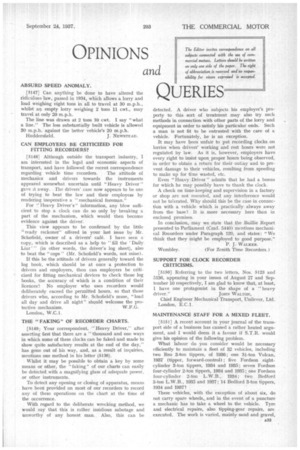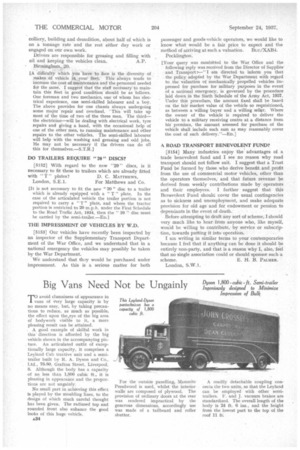OPINIONS
Page 59

Page 60

If you've noticed an error in this article please click here to report it so we can fix it.
and
UERIES
ABSURD SPEED ANOMALY.
[5147] Can anything be done to have altered the ridiculous law, passed in 1934, which allows a lorry and load weighing eight tons in all to travel at 30 m.p.h., whilst an empty lorry weighing 2 tons 11 cwt., may travel at only 20 m.p.h..
The line was drawn at 2 tons 10 cwt. I say "what a line." The less substantially built vehicle is allowed 30 m.p.h. against the better vehicle's 20 m.p.h.
Huddersfield. J. NEWSTEMD.
CAN EMPLOYERS BE CRITICIZED FOR FITTING RECORDERS?
[51481 Although outside the transport industry, I am interested in the legal and economic aspects of transport, and have followed the recent correspondence
regarding vehicle time recorders. The attitude of mechanics and drivers towards the instruments appeared somewhat uncertain until "Heavy Driver " gave it away. The drivers' case now appears to be one of trying to beat the law and their employees by rendering inoperative a "mechanical foreman.
For "Heavy Driver's" information, any blow suffident to stop a clock can do so only by breaking a part of the mechanism, which would then become evidence against the driver: This view appears to be confirmed by the little
ready reckoner" offered in your last issue by Mr. Schofield, owner of a drivers' café. I have seen a copy, which is described as a help to " fill the 'Daily Liar ' " (in other words, the driver's log sheet), also to beat the " cops " (Mr. Schofield's words, not mine).
If this be the attitude of drivers generally toward the log book, which should be at once a protection to drivers and employers, then can employers be criticized for fitting mechanical devices to check those log books, the accuracy of which is a condition of their licences? No employer who uses recorders would deliberately exceed the permitted hours, so that those drivers who, according to Mr. Schofield's muse, "load all day and drive all night" should welcome the pro tective mechanism. W.F. G. London, W.C.1.
THE "FAKING" OF RECORDER CHARTS.
[5149J Your correspondent, " Heavy Driver," after asserting first that there are a "thousand and one ways in which some of these clocks can be faked and made to show quite satisfactory results at the end of the day," has gone out of his way, and, as a result of inquiries, mentions one method in his letter (5136).
Whilst it may be possible to obtain a key by some means or other, the "faking" of our charts can easily be detected with a magnifying glass of adequate power, or other instruments.
To detect any opening or closing of apparatus, means have been provided on most of our recorders to record any of these operations on the chart at the time of the occurrence.
With regard to the deliberate wrecking method, we would say that this is rather insidious sabotage and unworthy of any honest man. Also, this can be
detected. A driver who subjects his employer's property to this sort of treatment may also try such methods in connection with other parts of the lorry and equipment in order to satisfy his particular ends. Such a man is not fit to be entrusted with the care of a vehicle. Fortunately, he is an exception.
It may have been unfair to put recording clocks on lorries when drivers' working and rest hours were not regulated by law. As it is, however, employers have every right to insist upon, proper hours being observed, in order to obtain a return for their outlay and to prevent damage to their vehicles, resulting from speeding to make up for time wasted, etc.
Even "Heavy Driver" admits that he had a bonus for which he may possibly have to thank the clock.
A check on time-keeping and supervision in a factory or shop are not resented, and any interference would not be tolerated. Why should this be the case in connection with a vehicle which is practically always away from the base? It is more necessary here than in enclosed premises.
In conclusion, may we state that the Baillie Report presented to Parliament (Cmd. 5440) mentions mechanical Recorders under Paragraph 129, and states: "We think that they might be employed to good purpose."
P. J. WALKER.
Wembley. (For Zenith Time Recorders.) SUPPORT FOR CLOCK RECORDER CRITICISMS.
[5150) Referring to the two letters. Nos. 5123 and 3136, appearing in your issues of August 27 and September 10 respectively, I am glad to know that, at least. I have one protagonist in the shape of a "heavy
driver.JOHN WALTQN,
Chief Engineer Mechanical Transport, Unilever, Ltd. London, E.C.I.
MAINTENANCE STAFF FOR A MIXED FLEET.
[5151] A recent account in your journal of the transport side of a business has caused a rather heated argument, and I would deem it a favour if S.T.R. would give his opinion of the following problem.
What labour do you consider would be necessary efficiently to maintain a fleet of 32 vehicles, including two Reo 3-ton tippers, of 1936; one 34-ton Vulcan, 1937 (tipper, forward-control) ; five Fordson eightcylinder 3-ton tippers, 1934 and 1935; seven Fordson four-cylinder 2-ton tippers, 1934 and 1935; one Fordson four-cylinder 2-ton L.W.B., 1934; two Bedford 3-ton L.W.B., 1935 and 1937; 14 Bedford 3-ton tippers, 1934 and 1937?
These vehicles, with the exception of about six, do not carry spare wheels,, and in the event of a puncture a mechanic has to take a wheel to the vehicle. Tyre and electrical repairs, also tipping-gear repairs, are executed. The work is varied, mainly sand and gravel, colliery, building and demolition, about half of which is on a tonnage rate and the rest either day work or engaged on our own work.
Drivers are responsible for greasing and filling with
oil and keeping the vehicles clean. A.P. Birmingham, 20.
[A difficulty which you have to face is the diversity of makes of vehicle in, your • fleet. This always tends to increase the cost of maintenance and the personnel needed for the same. I suggest that the staff necessary to maintain this fleet in good condition should be as follows. One foreman and two mechanics, one of whom has electrical experience, one semi-skilled labourer and a boy. The above provides for one chassis always undergoing some major repair and overhaul. " This will take up most of the time of two of the three men. The third— the electrician—will be dealing with electrical work, tyre repairs and giving a hand, with the occasional help of one of the other men, to running maintenance and other repairs to the other vehicles. The semi-skilled labourer will help with the washing and greasing and odd jobs. He may not be necessary if the drivers can do all this for themselves.—S.T.R.1 DO TRAILERS REQUIRE "20 " DISCS?
[5152] With regard to the new "20" discs, is it necessary to fit these to trailers which are already fitted with " T " plates? D. C. MATTHEWS,
London, S.E.1. For Matthews and Co.
[It is not necessary to fit the new "20 " disc to a trailer which is already equipped with a " T " plate. In the case of the articulated vehicle the trailer portion is not required to carry a " T" plate, and where the tractor portion is restricted to 20 m.p.h. under the First Schedule to the Road Traffic Act, 1934, then the " 20 " disc must be carried by the semi-trailer.—End THE IMPRESSMENT OF VEHICLES BY W.D.
[5153] Our vehicles have recently been inspected by an inspector of the Supplementary Transport Department of the War Office, and we understand that in a national emergency the vehicles may possibly be taken by the War Department.
We understand that they would be purchased under impressment. As this is a serious matter for both passenger and goods-vehicle operators, we would like to know what would be a fair price to expect and the method of arriving at such a valuation. Bau/XAB4. Pocklingten.
[Your query was sumbitted to the War Office and the following reply was received from the Director of Supplies'
and Transport I am directed to inform you that the policy adopted by the War Department with regard to the valuation of mechanically propelled vehicles impressed for purchase for military purposes in the event of a national emergency, is governed by the procedure laid down in the Sixth Schedule of the Army Act, 1937. Under this procedure, the amount fixed shall be based on the fair market value of the vehicle so requisitioned, as between a willing buyer and a willing seller. Where the owner of the vehicle is required to deliver the vehicle to a military receiving centre at a distance from his premises, the amount assessed for purchase of the vehicle shall include such sum as may reasonably cover the cost of such delivery."—En.] A ROAD TRANSPORT BENEVOLENT FUND?
[5154] Many industries enjoy the advantages of a trade benevolent fund and I see no reason why road transport should not follow suit. I suggest that a Trust Fund be formed by those who derive benefit and profit from the use of commercial motor vehicles, other than the operators themselves, and that future revenue be derived from weekly contributions made by operators and their employees. I further suggest that this Benevolent Fund should cover the usual contingencies as to sickness and unemployment, and make adequate provision for old age and for endowment or pension to dependants in the event of death.
Before attempting to draft any sort of scheme. I should very much like to hear from anyone who, like myself, would be willing to contribute, by service or subscription, towards putting it into operation.
am writing in similar terms to your contemporaries because I feel that if anything can be done it should be entirely non-party, and that is a reason why I, also, feel that no single association could or should sponsor such a
scheme. E. H. B. PALMER. London, &W.I.




























































































